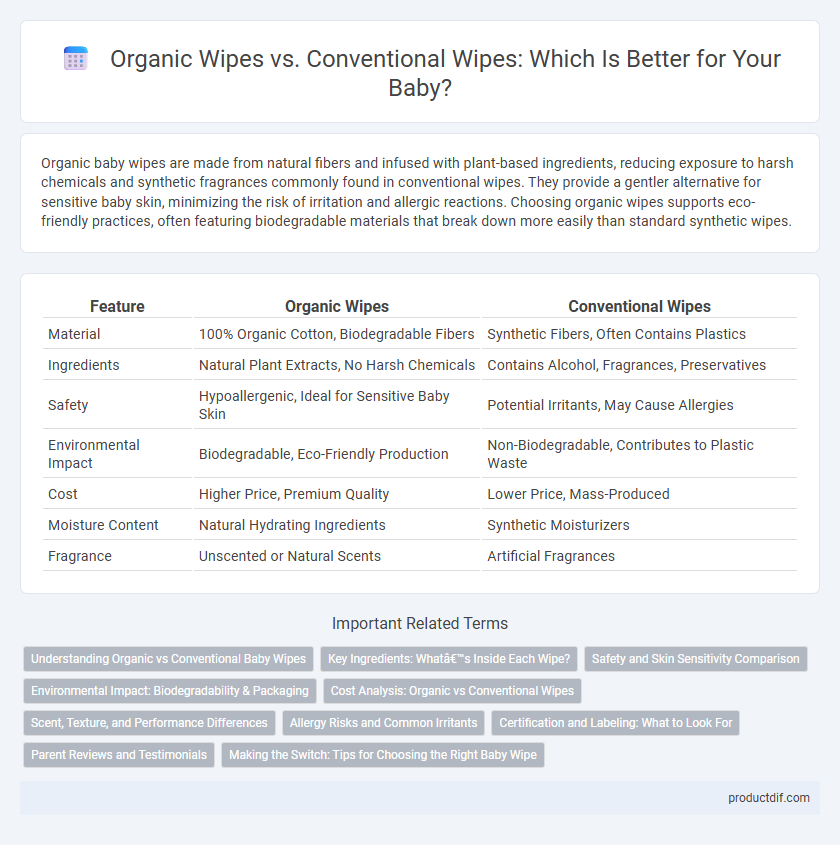Organic baby wipes are made from natural fibers and infused with plant-based ingredients, reducing exposure to harsh chemicals and synthetic fragrances commonly found in conventional wipes. They provide a gentler alternative for sensitive baby skin, minimizing the risk of irritation and allergic reactions. Choosing organic wipes supports eco-friendly practices, often featuring biodegradable materials that break down more easily than standard synthetic wipes.
Table of Comparison
| Feature | Organic Wipes | Conventional Wipes |
|---|---|---|
| Material | 100% Organic Cotton, Biodegradable Fibers | Synthetic Fibers, Often Contains Plastics |
| Ingredients | Natural Plant Extracts, No Harsh Chemicals | Contains Alcohol, Fragrances, Preservatives |
| Safety | Hypoallergenic, Ideal for Sensitive Baby Skin | Potential Irritants, May Cause Allergies |
| Environmental Impact | Biodegradable, Eco-Friendly Production | Non-Biodegradable, Contributes to Plastic Waste |
| Cost | Higher Price, Premium Quality | Lower Price, Mass-Produced |
| Moisture Content | Natural Hydrating Ingredients | Synthetic Moisturizers |
| Fragrance | Unscented or Natural Scents | Artificial Fragrances |
Understanding Organic vs Conventional Baby Wipes
Organic baby wipes use natural, biodegradable materials and plant-based ingredients free from harmful chemicals, offering a gentler option for sensitive baby skin. Conventional wipes often contain synthetic fibers, preservatives, and fragrances that may cause irritation or allergic reactions in some infants. Choosing organic wipes supports sustainability and reduces exposure to potentially toxic substances commonly found in traditional baby wipe formulations.
Key Ingredients: What’s Inside Each Wipe?
Organic baby wipes contain natural plant-based ingredients like aloe vera, chamomile, and purified water, avoiding synthetic chemicals, fragrances, and preservatives commonly found in conventional wipes. Conventional wipes often include polyester fibers and ingredients such as parabens, sulfates, and alcohol, which can cause irritation or allergic reactions on sensitive baby skin. Choosing organic wipes ensures fewer harmful substances, promoting gentler care and reducing the risk of skin irritation or toxicity for infants.
Safety and Skin Sensitivity Comparison
Organic baby wipes contain natural ingredients free from harmful chemicals, reducing the risk of skin irritation and allergic reactions common with conventional wipes containing alcohol, fragrances, and parabens. These wipes are often hypoallergenic and dermatologically tested, making them safer for babies with sensitive skin or eczema. Studies indicate that parents choosing organic wipes report fewer incidences of redness and discomfort, highlighting their advantage in maintaining delicate baby skin health.
Environmental Impact: Biodegradability & Packaging
Organic baby wipes are crafted from biodegradable materials like bamboo or cotton, significantly reducing landfill waste compared to conventional wipes made from synthetic fibers that can take hundreds of years to decompose. Packaging for organic wipes often utilizes recycled, compostable, or minimal plastic materials, further lowering environmental footprint. Conventional wipes commonly rely on plastic-heavy packaging and non-biodegradable fibers, contributing to microplastic pollution and persistent environmental damage.
Cost Analysis: Organic vs Conventional Wipes
Organic baby wipes typically cost 20-50% more than conventional wipes due to the use of natural, chemical-free ingredients and eco-friendly manufacturing processes. Conventional wipes are often mass-produced with synthetic materials, resulting in lower prices and wider accessibility. Parents seeking safer, hypoallergenic options may consider the higher upfront expense of organic wipes as a long-term investment in their baby's health and environmental sustainability.
Scent, Texture, and Performance Differences
Organic baby wipes are often infused with natural, subtle scents derived from essential oils, providing a gentle aroma compared to the synthetic fragrances found in conventional wipes, which may cause irritation. The texture of organic wipes tends to be softer and more breathable, crafted from plant-based fibers to reduce the risk of skin irritation, whereas conventional wipes might use synthetic fibers that can feel rougher and less absorbent. In terms of performance, organic wipes typically excel in being hypoallergenic and free from harmful chemicals, offering effective cleaning with minimal irritation, while conventional wipes may contain preservatives and alcohol that enhance durability but increase the likelihood of dryness or sensitivity.
Allergy Risks and Common Irritants
Organic baby wipes contain natural, hypoallergenic ingredients that significantly reduce allergy risks and exposure to common irritants like parabens, fragrances, and alcohol found in conventional wipes. Conventional wipes often include synthetic chemicals and preservatives that can cause skin irritation, redness, and allergic reactions in sensitive infants. Choosing organic wipes helps protect delicate baby skin by minimizing contact with harsh substances linked to eczema and dermatitis flare-ups.
Certification and Labeling: What to Look For
When choosing between organic wipes and conventional wipes, certification and labeling are critical indicators of safety and quality. Look for certifications such as USDA Organic, GOTS (Global Organic Textile Standard), and OEKO-TEX, which ensure the wipes are free from harmful chemicals and pesticides, while also verifying eco-friendly manufacturing processes. Labels stating hypoallergenic, dermatologically tested, and biodegradable further signal baby-friendly and environmentally responsible products.
Parent Reviews and Testimonials
Parents consistently highlight organic wipes for their gentle, hypoallergenic qualities, reducing skin irritation in newborns compared to conventional wipes containing synthetic chemicals and fragrances. Many testimonials emphasize the peace of mind organic wipes provide by using natural, biodegradable ingredients that support delicate baby skin and environmental sustainability. Conventional wipes often receive criticism for causing redness and allergic reactions, reinforcing the preference for organic options in parent communities prioritizing baby health and wellness.
Making the Switch: Tips for Choosing the Right Baby Wipe
Choosing the right baby wipe involves prioritizing sensitivity and eco-friendliness, which makes organic wipes a superior choice due to their natural, chemical-free ingredients. Organic wipes minimize the risk of irritation and allergic reactions, making them ideal for infants with delicate skin compared to conventional wipes that often contain synthetic fragrances and preservatives. When making the switch, consider factors like ingredient transparency, biodegradability, and certification labels to ensure both safety for your baby and environmental sustainability.
Organic wipes vs conventional wipes Infographic

 productdif.com
productdif.com